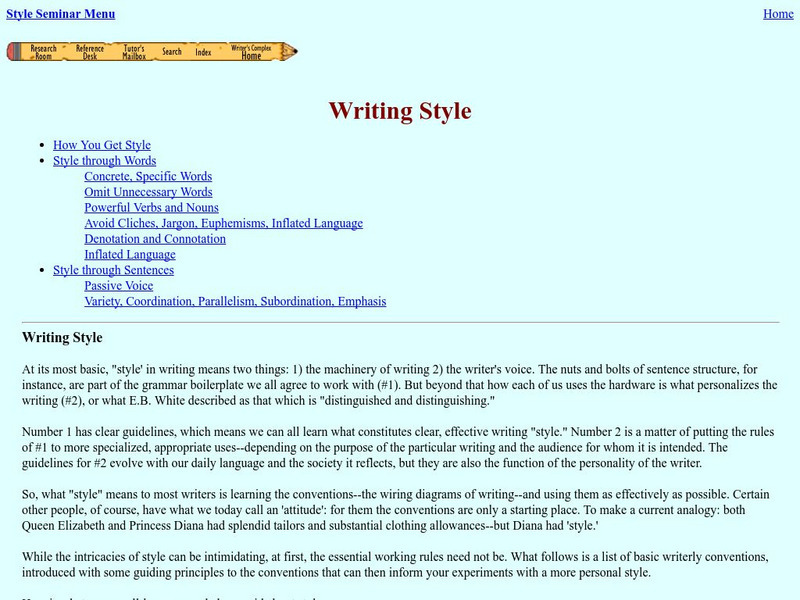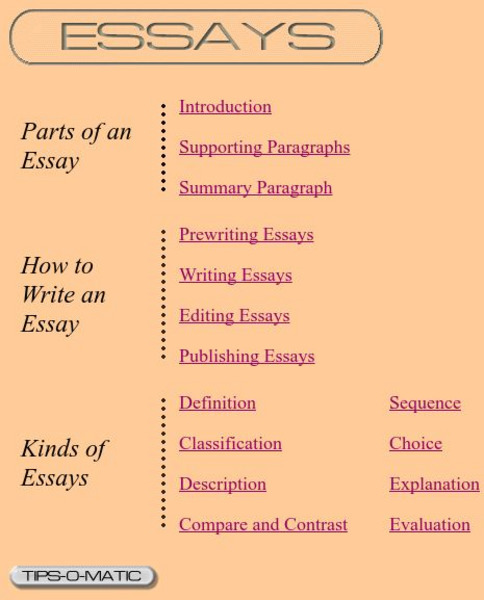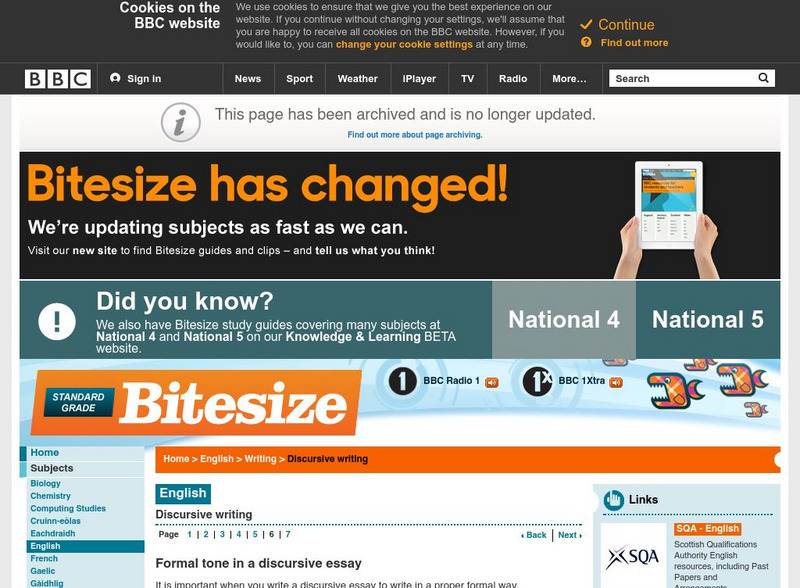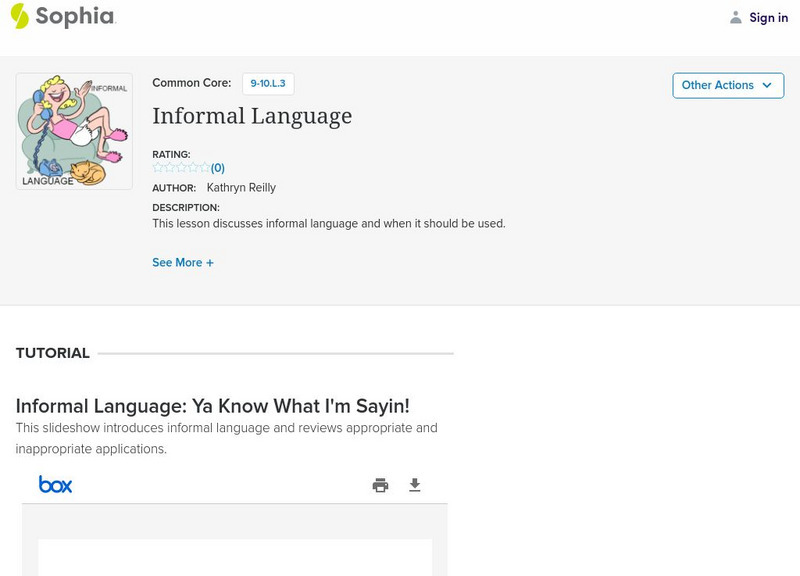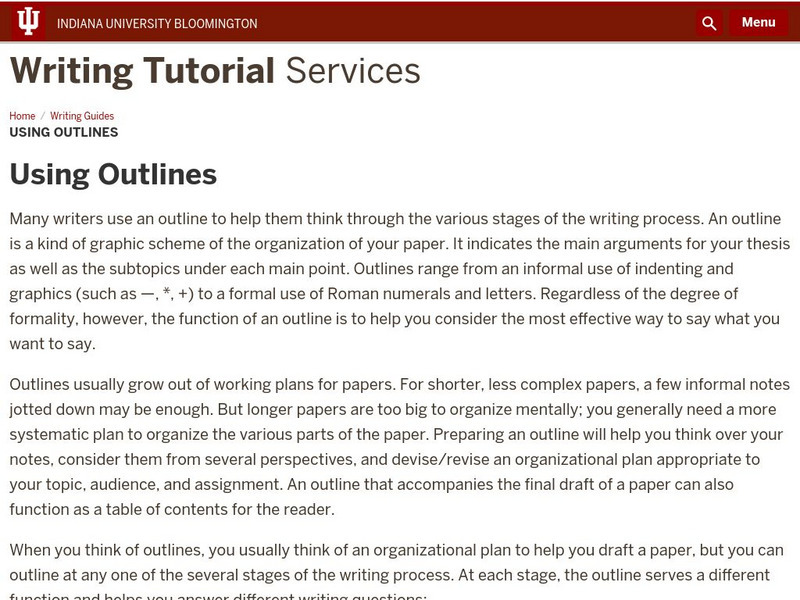Hi, what do you want to do?
Learning Farm
Learning Farm: Common Core Standards: Formal Writing
Writing formally means writing using words that are precise, objective, and impersonal. This lesson gives examples of formal language and also provides games and a test. CCSS.ELA-Literacy.WHST.6-8.2.e
Sophia Learning
Sophia: Formal Language
This slideshow lesson focuses on formal language. It reviews the basics of formal language and the need to know your audience. It explains how to change various types of informal language into formal language and provides examples....
BBC
Bbc: Skillswise: English: Formal and Informal Speaking Quiz [Pdf]
Assess the differences between formal and informal speech. Three levels of difficulty with answers provided.
Online Writing Lab at Purdue University
Purdue University Owl: Academic Writing: Levels of Formality
Basic information explaining how the context, i.e., the audience and your purpose, determines whether you should use formal, semi-formal, or informal language. The links on the sidebar provide much more information about formal academic...
Better Lesson
Better Lesson: Audience, Tone, and Style in Informative Text
Students will read samples of informative writing and highlight examples of how tone and style are used by the authors. Students will then apply this knowledge by writing their own informative text. Multiple examples of student work and...
BBC
Bbc: Skillswise: Speaking and Listening: Formal and Informal Speaking
This Skillswise site focuses on formal and informal speaking. Included are a video about how to decide whether to use formal or informal speech, fact sheets and worksheets for instruction. The Skillswise sites from BBC are geared to...
Annenberg Foundation
Annenberg Learner: Workshop 6: Responding to Writing: Teacher to Student
"Responding to Writing: Teacher to Student" [58:21] demonstrates how five teachers Jenny Beasley, Vivian Johnson, Mary Cathryn Ricker, Laurie Swistak, and Jack Wildea use student-teacher conferences to help their students improve as...
SUNY Empire State College
Empire State College: Writing Style Seminar
This detailed resource provides a good tutorial on writing style, whether informal or formal. It explains how to get style through word and sentence choice and includes lots of examples. W.9-10.1d & W.9-10.2e Style/tone/conv,...
Capital Community College Foundation
Guide to Grammar and Writing: Tone: A Matter of Attitude
This site focuses on tone and audience with examples.
TES Global
Tes: Letters: Formal & Informal
[Free Registration/Login Required] This resource provides explanations for different modes of writing. Examples of informal and formats are provided.
ACT360 Media
Writing Den: Essay Writing Tips
All you want to know about writing essays, from prewriting to editing. Click on the tip-o-matic and find tips on anything dealing with grammar or writing.
BBC
Bbc Bitesize Revision: Formal Tone in a Discursive Essay
This page provides several tips for using formal tone in an essay. The tips are arranged into 'Do' and 'Do not use' categories.
Sophia Learning
Sophia: Informal Language
This lesson discusses informal language and when it should be used. SL.9-10.6 Adapt to task/formal
ClassFlow
Class Flow: Formal Language
[Free Registration/Login Required] This flipchart can be used to understand features of formal official language through, collecting and analyzing examples, discussing when, why they are used; and noting the conventions of the language,...
BBC
Bbc Bitesize Revision: Discursive (Analytical) Writing
Short tutorial about discursive, or analytical, writing from a Scottish Standard Grade examination preparation site. Contains seven pages of information about the following: organising, essay examples, finding information, planning,...
BBC
Bbc Skillswise: Writing a Letter
This Skillswise site focuses on letter writing. Included is a video about why it is important to learn about letter writing, fact sheets and worksheets for instruction, and quizzes on the information presented. The Skillswise sites from...
New Zealand Ministry of Education
Nz Ministry of Education: Listen Up! Speak Up!
In this lesson students are given provided many opportunities to practice both informal and formal speaking skills. They begin with informal speaking in pairs, then groups of 4, etc. Then they write several drafts of a formal speech...
Grammarly
Grammarly Handbook: Cliches
This page focuse on cliches and explains why they should not be used in formal writing; it provides examples of other words to get the point across more clearly.
ReadWriteThink
Read Write Think: Lesson Plan: Audience, Purpose, Language in Electronic Messages
Lesson plan considers changes in writing style since the inception of e-mail and text messaging.
Grammarly
Grammarly Blog: Anytime vs. Any Time
This page focuses on changes in language usage pertaining to "anytime" and "any time." In informal writing "anytime" can be used, but in formal writing "any time" is perferable. Examples are provided.
TES Global
Tes: Non Fiction Unit 4 Formal/impersonal Writing: Tourists
[Free Registration/Login Required] Students will analyze tourism brochures to determine features related to nonfiction writing in this unit. Tourism websites may be used in lieu of the brochures. Cotswold and the North Leigh Roman Villa...
Sophia Learning
Sophia: Paper Writing: Outlines
Show students how essential an outline is to writing a paper. This source provides explanations for writing an outline and information about how to create both formal and informal outlines.
Indiana University
Indiana University: Writing Guides: Using Outlines
Explains how outlines can be used at different stages in the writing project. Covers outlines developed during research, prewriting, and drafting. Also discusses the formal outline, which may be required with a finished paper. Gives...
Grammarly
Grammarly Handbook: Informalities
A list of style techniques (with examples) used to create an informal tone in a written piece.





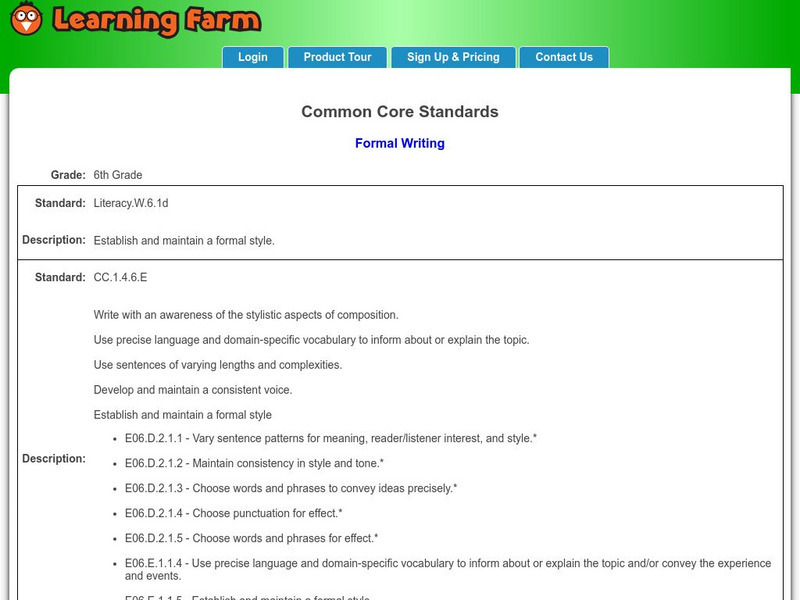
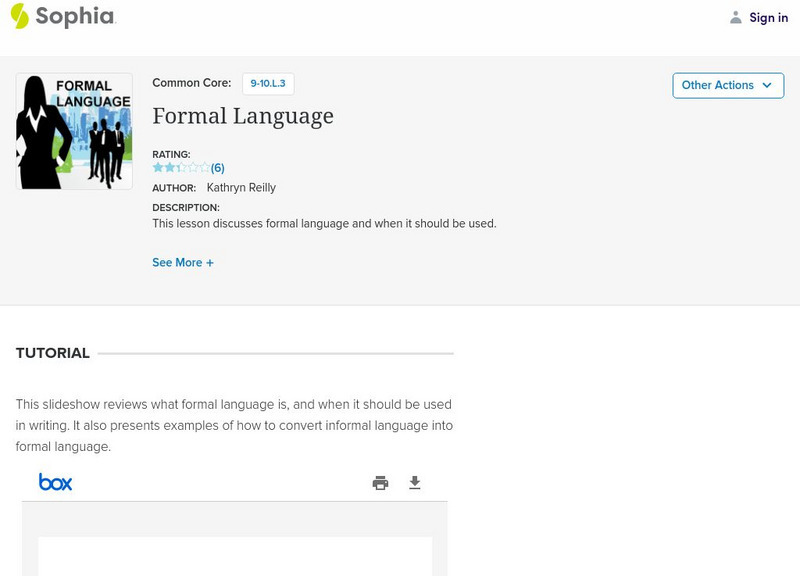
![Bbc: Skillswise: English: Formal and Informal Speaking Quiz [Pdf] Unknown Type Bbc: Skillswise: English: Formal and Informal Speaking Quiz [Pdf] Unknown Type](http://lessonplanet.com/content/resources/thumbnails/411268/large/bwluav9tywdpy2symdiwmduymc0ymtiwny1jegxunwmuanbn.jpg?1589993555)




